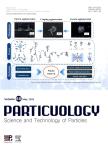Aerosol optical absorption by dust and black carbon in Taklimakan Desert,during no-dust and dust-storm conditions
Aerosol optical absorption by dust and black carbon in Taklimakan Desert,during no-dust and dust-storm conditions作者机构:Xinjiang Institute of Ecology and GeographyChinese Academy of SciencesUrumqi 830011China Graduate School of the Chinese Academy of SciencesBeijing 100049China Urumqi Institute of Desert MeteorologyChina Meteorological AdministrationUrumqi 830002China School of Resources and EnvironmentUniversity ofJinanJinan 250000China
出 版 物:《Particuology》 (颗粒学报(英文版))
年 卷 期:2012年第10卷第4期
页 面:509-516页
核心收录:
学科分类:07[理学] 0817[工学-化学工程与技术] 070601[理学-气象学] 0705[理学-地理学] 0805[工学-材料科学与工程(可授工学、理学学位)] 070501[理学-自然地理学] 0706[理学-大气科学] 0703[理学-化学] 0702[理学-物理学]
基 金:supported by Special Fund for Public Welfare Industry (Meteorology) (GYHY200706008) Special Fund for Public Welfare Industry (Meteorology) (GYHY200806011) "Western Light" Project of Chinese Academy of Sciences(RCPY200902) China Desert Meteorological Science Research Fund (Sqj2006001)
主 题:Black carbonDustAbsorption coefficientAbsorption exponent of absorptioncoefficientDecoupling of absorption coefficient
摘 要:Aerosol absorption coefficient σap involves the additive contribution of both black carbon aerosol (BC) and dust aerosol. The linear statistical regression analysis approach introduced by Fialho et al. (2005) is used to estimate the absorption exponents of BC and dust aerosol absorption coefficients, and further to separate the contributions of these two types of aerosols from the total light absorption coefficient measured in the hinterland of Taklimakan Desert in the spring of 2006. Absorption coefficients are measured by means of a 7-wavelength Aethalometer from 1 March to 31 May and from 1 November to 28 December, 2006. The absorption exponent of BC absorption coefficient α is estimated as (-0.95 ± 0.002) under background weather (supposing the observed absorption coefficient is due only to BC); the estimated absorption exponent of dust aerosol absorption coefficient/5 during the 6 dust storm periods (strong dust storm) is (-2.55 ± 0.009). Decoupling analysis of the measured light absorption coefficients demonstrates that, on average, the light absorptions caused by dust aerosol and BC make up about 50.5% and 49.5% respectively of the total light absorption at 520 nm; during dust weather process periods (dust storm, floating dust, blowing dust), the contribution of dust aerosol to absorption extinction is 60.6% on average; in the hin- terland of desert in spring, dust aerosol is also the major contributor to the total aerosol light absorption, more than that of black carbon aerosol.



